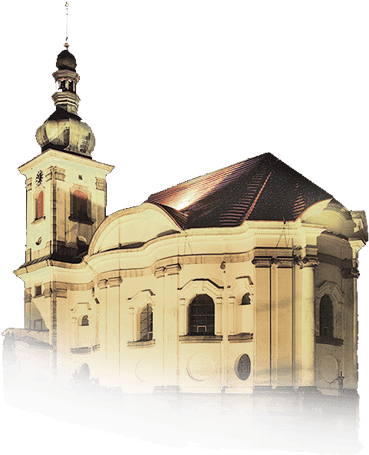1. koncert
Opening Concert
6th April 2019 at 7 p.m.
CZK 500 a 450
Miroslav Smrčka – trumpet
Virtuosi Pragenses – chamber orchestra
2. koncert
Songs by Suchý and Šlitr and Folk Music Inspirations
7th April 2019 at 7 p.m.
CZK 450 a 400
Emil Viklický Trio
3. koncert
Chanson Mon Amour
11th April 2019 at 7 p.m.
CZK 450 a 400
Renata Drössler – vocal
Jakub Tököly – keys
Tomáš Baroš – double bass
4. koncert
Music of Southern Europe and Beyond
18th April 2019 at 7 p.m.
CZK 450 a 400
Ladislav Horák – accordion
Gorka Hermosa (Spain) – accordion
5. koncert
The Beauty of the Baroque and Romanticism
20th April 2019 at 7 p.m.
CZK 500 a 450
Pavel Svoboda – organ
Gustáv Beláček (Slovakia) – vocal
The concert will be projected onto a screen, so the audience will have the unique opportunity to watch the performers at the organ.
Accompanying exhibition
Exhibition of the works of artist Mikuláš Cacara.
The Epiphany Chapel
The Epiphany Chapel (Kaple Zjevení Páně; originally the Three Magi Church) was built by Jan Josef, Count of Šternberk, in 1699–1711. It was probably designed by Christoph Dientzenhofer.
The ground plan is a slightly elongated octagon (resembling the Šternberk star). The frescoes were made by Jan Jakub Stevens of Steinfels and their themes are connected to the prophecy of Christ’s arrival. The dominant painting in the chapel is Petr Brandl’s masterpiece, Adoration of the Magi (1727), on the high altar. The painting is complemented by F. J. Pacák’s sculptures and by a panel painting of Madonna with Child by an unknown 16thcentury artist.
Another painting by Brandl is St. Blaise (ca. 1713), which is located on the sponsored altar. The side-altars feature two paintings: Glorification of John of Nepomuk (Carlo Carlone, 1724) and Madonna Passing the Rosary to St. Dominic (O. Maywald, 1755). The wooden benches, pulpit, the Infant Jesus Altar and the lower part of the high altar were made by carver K. Devoty.
The chapel is valuable not only in terms of architecture but also due to its unique, compact, stylistically uniform interior, which has not changed substantially since the chapel was finished. Because of its remarkable architecture the chapel has been a national cultural heritage site since 1996, and P. Brandl’s painting, Adoration of the Magi, became a national cultural heritage work of art in 2006.





